

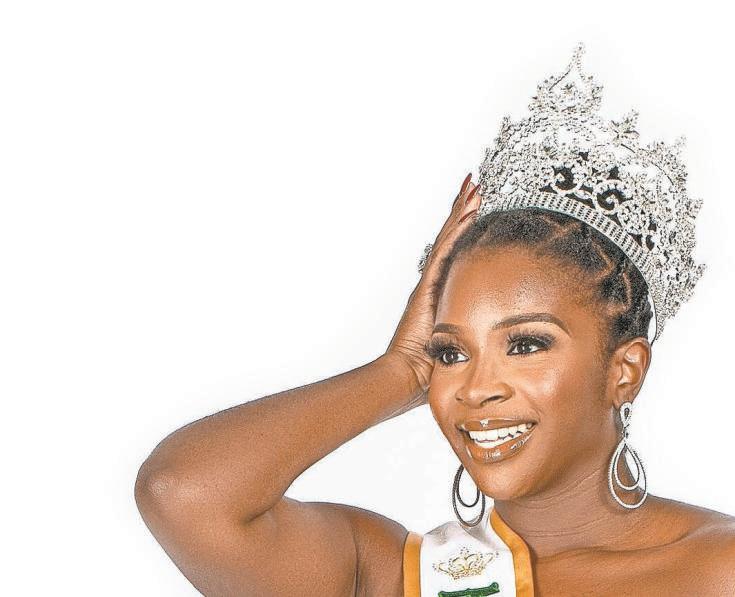








Single adults must make an average pretax salary of $75,088 to live comfortably in Houston. Getty Images/Eleganza
Making ends meet feels like a never-ending challenge. But for single Houstonians, you should be aware of some good and some notso-good news. According to the latest report from SmartAsset, the city is leading the pack when it comes to needing the lowest salary to live comfortably in 2024. Now, you’re probably asking what the magic number is. If you’re single, you’ll need to bring in about $75,088 a year (before tax) to keep the lights on without consistently checking your bank balance.

Last year, it used to be about $62,260. Tat means to live a fnancially stable life based on the 50/30/20 strategy, a single person needs to spend $37,544 of their salary on living expenses, $22,526 for discretionary costs, and put about $15,017 toward savings or debt payments. For those whose salaries missed the mark, this is a good time to ask yourself some questions. Can you get a raise? If not, can you get a second job? Or can you transfer your skills to a place that meets your income standard? It’s hard out here, and no one should be struggling to make ends meet with a salary in the number one city recognized for its “afordability.”
increase from the previous year’s 83.7 cents. Tis fght extends beyond a single day, persisting every day of the year. For Black women, the wage gap is even more pronounced. With Black Women’s Equal Pay Day falling on July 9, Black women make 69 cents for every dollar an average man makes. It’s evident that discussions on equal pay shouldn’t be confned to designated days but should remain at the forefront of public discourse until tangible change occurs.
Speaking of salary, the battle for equal pay rages on as Equal Pay Day once again highlights the wage disparity between men and women. While women contribute signifcantly to their families and the economy, they continue to face unequal compensation in the workplace. Despite progress, the latest Census Bureau data reveals that women earn only 84 cents for every dollar earned by men, a marginal
Te Israel and Palestine crisis has created a lot of division throughout the years. As the issue continues to escalate, some people are taking a stand against U.S. military and defense companies between Israel and Hamas. Dozens of musicians and speakers at the South by Southwest festival in Austin canceled appearances in protest of events sponsored by U.S. military and defense companies. Texas Gov. Greg Abbott was petty with his response, “Bye. Don’t come back.” What a great leader we have, huh? SXSW kept it neutral and respected the artists’ free speech but defended its decision to accept the sponsors. Te U.S. military is constantly supportive of Israel. And since the Gaza invasion following Hamas’ Oct. 7th attack, over 30,000 people have been killed and 70,000 injured in Gaza.
• Do Zodiac signs really determine your personality?
• Check out the Links Boots & Bling photo gallery.
• Unpaid internships: Are they worth it these days?
Te City of Houston recently agreed to a historic settlement with frefghters that will see $650 million being awarded in back pay for current, retired, and family members of fallen firefighters who have worked without a contract since 2017. While frefghters are celebrating the settlement, some City Council members are questioning the specifcs of the settlement agreement, while others are questioning exactly where the money will come from.

Te Houston Professional Firefghters Association said 94% of firefighters overwhelmingly voted to approve the historic contract, which also ofers up to 34% raises for frefghters over the next fve years.
Te deal comes afer an extensive, yearslong battle. Former Mayor Sylvester Turner’s resistance to higher pay demands from the frefghters’ union had kept the city in a prolonged state of negotiation. Mayor John Whitmire, who pledged to abandon any lingering legal battles, shortly afer taking ofce lauded the landmark settlement as a signifcant breakthrough for both parties.
“Houston’s fre department should be at or near the top among the major cities in our state,” Whitmire said. “Tis agreement resolves a long-festering pay dispute with frefghters, avoids further unnecessary litigation costs, and allows us to move forward together.”
Under the terms of the settlement, all current and retired frefghters, as well as families of deceased frefghters since 2017, will receive lump sum payments covering owed wages from that year onward. With salary enhancements locked in until 2029, the overall pay boost for frefghters could reach up to 34% over the contract’s duration, as per city estimates.
Whitmire hailed the agreement as essential for attracting and retaining firefighters critical to serving Houston, emphasizing its role in averting protracted legal battles and ensuring fscal stability.
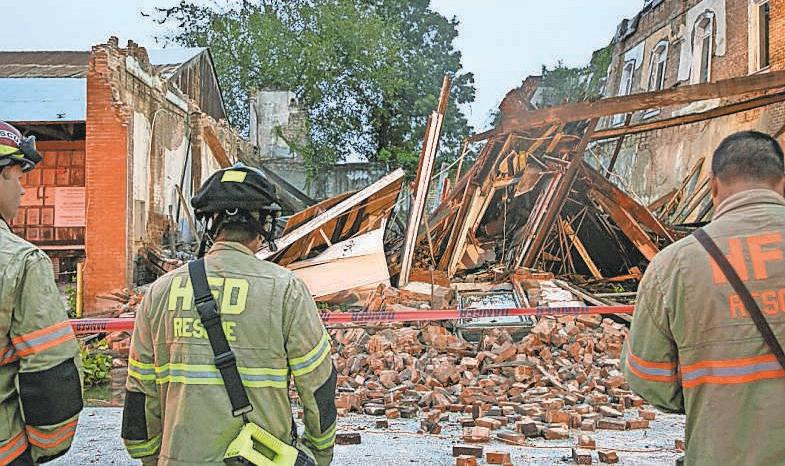
allows us to start moving forward,” Lancton said. “Everybody came to the table. Everybody worked together.”
Not everyone is completely on board with the agreement, however. Houston City Council members Edward Pollard and Tifany D. Tomas are leery of the contract and questioning the terms of the agreement and how the more than half a billion dollars will be paid back. “How do you put this out and not believe that people would ask questions?” said Tomas.
We all support our frefghters, there’s no doubt. But can we aford this?
EDWARD POLLARD CITY COUNCIL MEMBERHouston Professional Fire Fighters Association President Patrick M. “Marty” Lancton said the agreement represents a signifcant milestone toward fostering cooperation and stability within Houston’s frefghting community.
“This brings finality to everything and
In a letter to the mayor, Tomas and Pollard highlighted concerns about how the deal could impact the fscal integrity of the city. Tey cited 10 questions “on whether the proposed deal is in the city’s best fnancial interest, or will it ultimately cause dire fscal challenges that will impact services city wide for years to come.”
“These are just some very basic questions that council members and the general public should want to know,” Thomas said. “The information has not been provided from the administration to help us color in the lines. I don’t want my name on the record for making a poor fnancial decision for the city.”
“This may be a good agreement, but we don’t know the details. We don’t know what concessions were made. Tis is a negotiation, then what concessions did the fre union put forth? How did we get to this exact number?” added Pollard.
Both council members agree that the city’s frefghters should be paid fairly, but they say they haven’t received enough details on the settlement.
“We are in agreement that our frefghters must be paid a competitive salary, however, due to minimal engagement from your ofce on any specifcs, and non-response from you to previous emails on the subject, we have questionsquestions,” the two council members wrote.
One of the biggest concerns is how a settlement of this magnitude will impact taxpayers.
“I think that we should have a detailed understanding of what that is. How are we going to pay for that? Because a bond has to be repaid,” said Tomas.
Pollard and Tomas asked how Houston frefghters’ current compensation compares with other Texas cities, whether the administration plans to ask voters to amend or eliminate the city’s cap on property tax revenue growth to help pay for the deal and what interest rate the city will have to pay on the $650 million judgment bond, among
other questions.
City officials say judgement bonds will cover the back pay and will come at an annual cost over the next 25 to 30 years, but the specifcs are still being worked out by the city’s fnance department.
Budget Director Melissa Dubowski has said the city will have to close a $160 million budget gap in the next fscal year, a fgure that does not account for the frefghters’ raises. Te City hasn’t said what will fund the pay increases.
One concern from skeptics with the settlement: What happens the next time negotations come up? Te Houston Police Ofcers Union is set to negotiate its contracts next year.
“When you think about the fiscal challenges that are looming for our city, we have to ask the tough questions to ensure that we have all the answers,” Pollard said. “We all support our frefghters, there’s no doubt. But can we aford this?”
“Te City’s ongoing battles with the fre union are unique, and I don’t believe you can compare this to police or the employees union,” said a spokesperson for the Mayor’s ofce.
Attorneys involved said the negotiations were confdential up until the agreement was reached. It may be June before the paperwork is done to complete the deal. A judge must sign of on the fnal agreement.
A Philadelphia man won’t be retried in a 2011 shooting that injured four people, including a 6-year-old girl, and sent him to prison for more than a decade at age 17. A judge closed the case against C.J. Rice, now 30, months afer a federal judge found the defense lawyer at his 2013 trial defcient and the evidence “slender.” Rice had been serving a 30- to 60-year prison term until he was released amid the federal court ruling late last year.
Te case was formally dismissed afer District Attorney Larry Krasner decided not to retry it. While he said most of the 45 exonerations his ofce has championed have been more clearcut cases of innocence, he found a new look at the evidence in Rice’s case more nuanced.
“Te case falls within that 15% or so (of exoneration cases) where we believe it’s murky,” Krasner said at a press conference where he was joined by defense lawyers who pushed back on that view.
The case garnered national attention afer journalist Jake Tapper shed light on
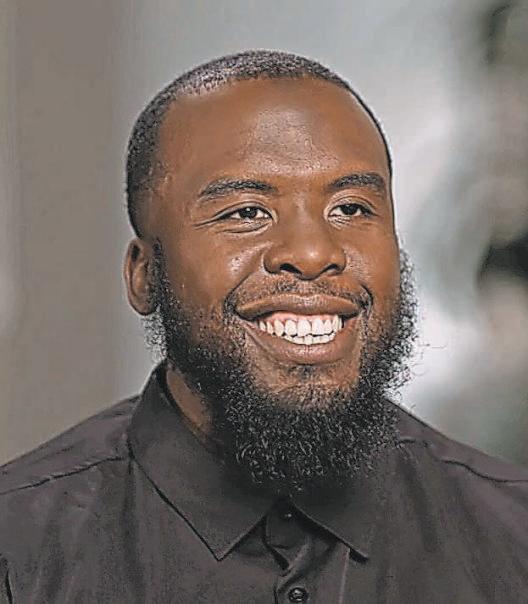
the defendant’s inadequate legal representation. Tapper, a seasoned anchor at CNN, had a personal connection to the matter. His father, Dr. Teodore S. Tapper, had treated Rice for a gunshot wound just six days before the shooting incident that led to his conviction. In an article titled “Tis Is Not Justice: A Philadelphia teenager and the empty promise
of the Sixth Amendment,” published in Te Atlantic last year, Tapper scrutinized Rice’s legal representation, depicting his attorney, Sandjai Weaver, who passed away in 2019, as overwhelmed and unable to adequately defend Rice. Tapper accused Weaver of being “dangerously incompetent.”
Following the publication of Tapper’s exposé, a judge ruled that Rice had received inefective assistance from his trial counsel, ultimately leading to the overturning of his conviction.
Te decision marks a signifcant development in Rice’s legal battle and underscores the importance of efective legal representation in ensuring justice is served.
“Tis matter will now be referred to the DA’s Sentencing Review Committee, which includes homicide prosecutors and will invite participation of survivors of the 2011 shooting for which Mr. Rice was previously convicted,” the district attorney’s ofce said in a statement. “Afer the Sentencing Review Committee makes a recommendation on how to proceed with the charges against petitioner Rice, the decision of District
Attorney Larry Krasner will be formally communicated to the Court of Common Pleas ahead of its ruling. We expect this matter to be fnally resolved within the next several months.”
Tapper’s 2022 article shined light on the case, including details about Rice’s physical condition in the lead-up to the shooting.
According to the article, one of the four shooting victims had told police she had seen Rice sprinting away from the scene. But Dr. Tapper would testify that he had just seen Rice in severe pain, with serious physical impairments, just days before.
“The amount of pain that I saw him with and the inability to stand and get onto and of the table in my ofce on the 20th of September makes me very dubious as to whether he could walk standing up straight, let alone run with any degree of speed, fve days afer I saw him,” the elder Tapper told the court during Rice’s trial, according to his son’s article.
Rice and Dr. Tapper corresponded through letters for years, with the latter believing the former was wrongfully convicted.
Several TikTok creators are outraged over a bipartisan bill passed by the House of Representatives recently that would lead to a nationwide ban of the popular video app if its China-based owner, ByteDance, doesn’t sell its stake. Te bill still needs to go through the Senate, where its prospects are unclear.
Content creators say a ban would hurt countless people and businesses that rely on TikTok for a significant portion of their income, while also arguing TikTok has become an unrivaled platform for dialogue and community.
“Social media is a powerful tool,” said Marcus Bridgewater, a former
private school teacher and administrator who owns his own business and posts TikTok gardening videos. Bridgewater, who lives in Spring, wants Congress to be focused on those issues, and not whether the app is Chinese-owned. “And powerful tools are just that: Tey are capable of helping us transcend ourselves, but in their transcendence, they’re also capable of completely severing us from those we love.”
30% Black
31% Hispanic
the app from Chinese authority follows concerns from lawmakers, law enforcement and intelligence ofcials about the insecurity of user data, potential suppression of content unfavorable to the Chinese government and the possibility that the platform could boost pro-Beijing propaganda, all of which TikTok denies.
18% Whites
TikTok, which launched in 2016, has skyrocketed in popularity, growing faster than Instagram, YouTube or Facebook. Te push to remove
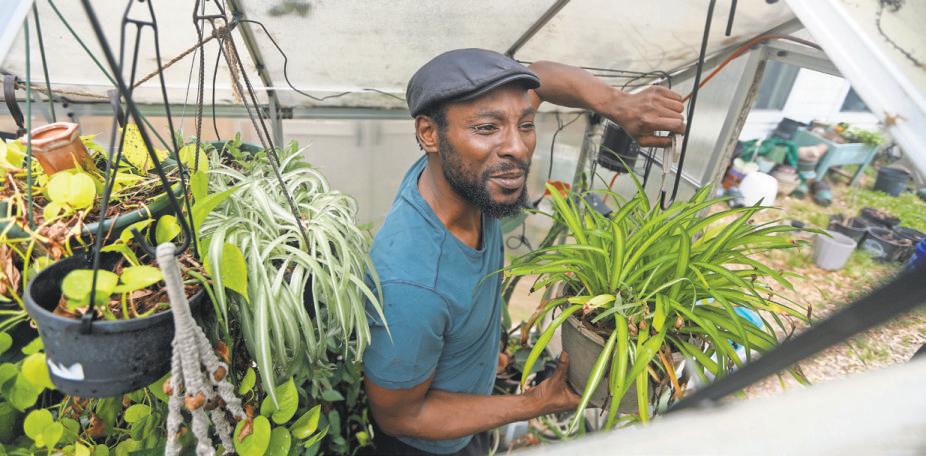
To date, the U.S. government hasn’t provided any evidence showing TikTok shared U.S. user data with Chinese authorities.
Te move comes as the pandemic saw huge growth in digital marketing as people were stuck at home consuming — and creating — content at levels not seen before.
Some creators describe it as a digital equalizer of sorts, providing a platform for people of color and other marginalized groups to get opportunities and exposure.
“I’ve always had Twitter, I’ve had Facebook, I’ve had Instagram. But TikTok was the frst one where, if you want to fnd somebody who looks like yourself and represents you in any type of way, you can fnd it,” said Joshua Dairen, a Black, 30-year-old content creator who makes videos about his state’s ghost stories, urban legends and history.
Growing up, he loved researching everything paranormal, but he didn’t see a lot of Black representation in the feld. Exposure on TikTok has led to jobs writing freelance pieces and contributing to documentaries about paranormal occurrences and unsolved mysteries. Te app also gave Dairen the fexibility and confdence to open his own cofee shop, where he gets visits at least once a day from fans of
his work.
He thinks banning TikTok sets “a dangerous precedent about how much power our highest levels of government can wield.”
Recent demographic data highlighted TikTok’s broad reach, with over 834 million users globally. In the United States, TikTok boasts the largest audience, with over 135 million users, most of whom are under 20 years old.

Te Uplif Harris Guaranteed Income Program has ofcially begun notifying applicants who have been accepted into the program. Te program will provide $500 monthly payments to nearly 2,000 households with an income below 200% of the federal poverty level ($60,000 a year for a family of four), for 18 months. According to Harris County Public Health, individuals who have been accepted will have four weeks to complete enrollment to the program either online or in person. Te frst payments are expected to go out in late April. More than 82,000 residents applied for the program, and about 6,000 of them were chosen to advance past the frst stage
of the selection process. From there, candidates were chosen through a lottery system. Te program is funded by a $20.5 million federal grant from the American Rescue Plan Act. Applicants who have not been notifed but want to still check their status can visit Uplifharris.com.
Te Houston Health Department and the Ibn Sina Foundation are partnering to provide free or low-cost vaccinations, health screenings, and education. A series of community health fairs are being hosted across the City of Houston throughout the year. Twelve community “health improvement” fairs are being organized through the health department’s Community Assistance and Transition Care of Houston Initiative (CATCH). Six zip codes, including 77022, 77093, 77016, 77026, 77028, and 77076 were identifed as areas where health attention is needed the most. Participants will also get the opportunity to enroll in medical benefts that include Harris Health Gold Card, SNAP, Medicaid, Medicare and Women, and Infants and Children benefts (WIC). Residents are being asked to provide items such as an identifcation or passport, social security cards, utility bill or receipt, proof of income, and a current bank statement to see if they qualify for benefts. Read more on defendernetwork.com to see a list of upcoming locations.
A new teen pregnancy shelter has opened on Houston’s Northside. Taylor’s House of Hope will provide pregnant
teens with emotional, maternal health, and mental health support in the Houston area. Tey will also eventually be able to provide teens with a temporary home or help them fnd a more permanent living situation. Taylor Harris started the House of Hope in 2019 and will now be running the facility near the Hardy Toll Road and Little York with her mother. She said she was inspired to start this organization because she was once in the same position. Harris said they are currently looking for 12 teens that will go through a nine-week program. Harris partnered with Community Health Choice to provide the essentials needed at the community baby showers. Community Health Choice has been working with Harris since 2020.

Texas Southern University and the University of Houston share several things in common, including the official year each institution was founded (1927) and their geographic location (literally right across the street from each other in Houston’s historic Third Ward).
They share something else, as well – an institutional commitment to improving the health outcomes and realities for residents of Third Ward and beyond.
Born during the tail-end of the COVID-19 pandemic, TSU’s Center for Transformative Health (CTH) has become a force for change.
The UH Health Family Care Center (FCC), now roughly two-and-a-half years old, has already established itself as a community staple.
Statistics have shown that Black and Brown communities and individuals living in urban settings were hit the hardest and suffered the most during the COVID-19 pandemic. That pandemic magnified and made plain to the larger society common health problems that have plagued these communities for decades.
Enter TSU’s CTH, which strives to conduct research and help develop multi-level interventions that not only drive change in population health, but further the science that transforms lives.
“We realized very quickly with COVID-19, based upon a lot of data that we’ve collected in the last three years, that there was need for a public health agenda beyond COVID-19,” said Zuri Dale, the center’s executive director.
Dale said because there’s a synergy between infectious diseases and chronic diseases, and because community members who contracted COVID-19 had so many other conditions, TSU’s COVID care team, which Dale led, began to wonder if there was some association between their patients’ infections and chronic conditions they already have (i.e. diabetes, heart disease, COPD, high cholesterol, stroke, asthma, obesity, etc.).

Dale’s curiosity fueled her desire to create a more comprehensive and holistic approach to disease prevention and surveillance and general healthcare. The result: the Center for Transformative Health.
“We use evidence-based practices to strengthen the conditions that promote health overall. We focus on infectious diseases and chronic diseases. We do that synergistically. It’s a little bit different than other centers because some choose infectious versus chronic. We do a little bit of both. We also do a little bit of mental health work, because we have seen a new onset of anxiety and depression since COVID-19,” said Dale.
“And just by virtue of where TSU is positioned in the community, we do a lot of community engagement, getting out educating the community on prevention, offering primary screenings, and a lot of service linkage, connecting individuals to institutions providing the care they need.”
The CTH’s overall initiative is structured around the following:
• Engaging stakeholders and community coalitions in conducting research focused on health promotion and disease prevention
• Implementing multi-disciplinary community-based research initiatives
• Designing opportunities that address the prevention and control of infectious diseases
• Expanding access to mental health resources and providers
• Continuing to analyze the lessons learned during the COVID-19 pandemic and be prepared to assist in the next public health emergency.
TSU’s across-the-street neighbor, the University of Houston Main Campus, has its own new-ish health-related institution; the Tilman J. Fertitta Family College of Medicine
and its UH Health Family Care Center which offers affordable, comprehensive primary care services (primary care, women’s health, outpatient mental health services, integrated behavioral health services and psychiatry) in one convenient location.
And the FCC wasted no time establishing real relationships with Third Ward institutions and individuals.
“As a stakeholder in the Third Ward community, Boynton Chapel Methodist Church is committed to leveraging the strengths of research and faith communities towards efforts to improve the social determinants of health
in underserved communities,” said Reverend Linda Davis, pastor of Boynton. “With that said, Boynton is excited about the University of Houston Family Care Center. The Family Care Center is an on-campus health clinic that provides affordable, comprehensive and integrated primary care and mental health services to the University of Houston community and surrounding neighborhood.”
backpacks and school supplies, Community Health Choices, the Houston Texans YMCA, non-profits like Sock Out Poverty and the V.O. Burton Foundation, Boynton, and others, including multiple other UH centers and offices.

We realized very quickly with COVID-19, based upon a lot of data that we’ve collected in the last three years, that there was need for a public health agenda beyond COVID-19.”
Paule Anne Lewis, the UH College of Medicine’s associate vice president of business operations, spoke with the Defender last August during the center’s inaugural Back to School Block Party, about the FCC’s investment in Third Ward.
“We believe that health and education are equally important to children,” she said. “So, we want to make sure that kids in our community, specifically here at UH and Third Ward, are getting a healthy good start back to school this year. So, we’re providing them vaccines, eye exams and free sports physicals.
“One of the best things about being part of the University of Houston is having so much support across the university for all of our initiatives in our community,” shared Lewis.

Sidney Lacey, a UH alum and FCC board member, has taken it upon himself to serve as a connector between the FCC and Third Ward and Greater Houston service providers.
“I actually go to city councilmen, to people involved in community service already and get information to them and the FCC so they can distribute, because they’re the connectors in
the community already,” said Lacey. “What we’re trying to do is not come in from the top down and tell people how to do things. There are people already, people in the community, who know how to do things. We just provide a service and the only way we can get that to them is that the people already connected in those areas serve.
“What we’re doing now for the community, between the FCC to take care of those needs that are the everyday needs, and then to the [Fertitta] medical school training the future staff, I couldn’t be more proud.”
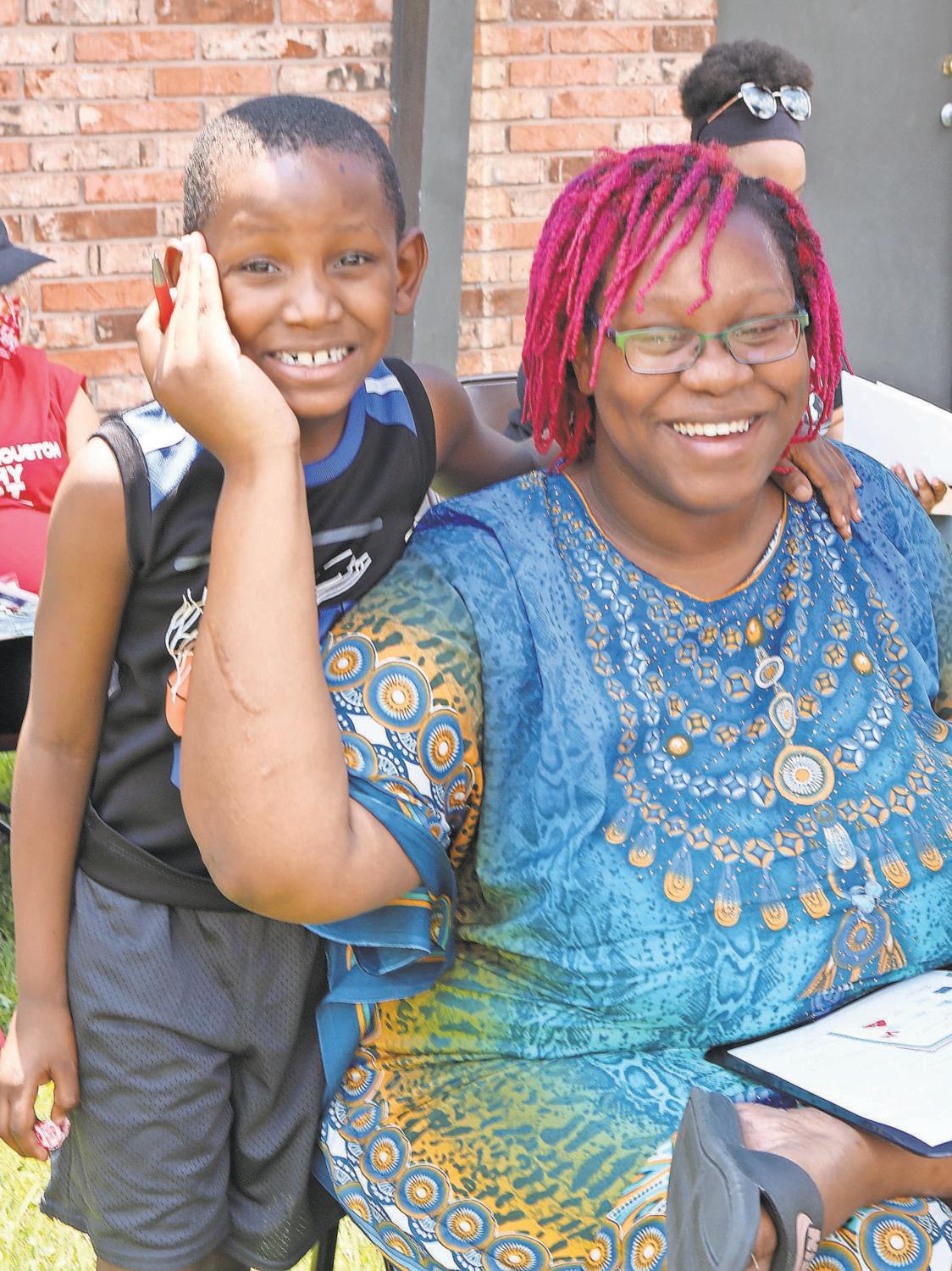

During that event, the FCC partnered with the area H.E.B. which provided attendees with
Of all the things K-12 schools have to contend with – bullying, underfunding, teen dating violence, book bans, etc. –there’s yet another monster issue these campuses must confront. Human trafcking.
But on school campuses?
Yes; according to these sobering facts:
Over 55% of trafcking survivors report that their frst introductions to being sold for sex happened while at school or at school-related activities. This includes being groomed, solicited, recruited, and contacted. Evidence-based data and cases prove that in cities and states across the nation, schools are hot spots for domestic child sex trafcking. Predators are using other kids and technology to lure, groom, and solicit our children, mainly during school hours and at school activities.
Now, according to the National Foster Youth Institute, 60% of all child victims of human trafcking nationwide have a history in the child welfare system, many of them found during raids on sex trafcking rings across the country. And this illegal activity was said to be surging this past year.
Tat’s why NTZ (No Trafcking Zone), an organization focused on “dismantling and disrupting human trafcking,” celebrated the passage of HB 3554 earlier this year.
“Te law protects children and youth in Residential Treatment Centers, homeless youth shelters, juvenile detention centers, foster care facilities, daycare centers and other locations where human trafckers prey on society’s most vulnerable children,” according to an NTZ statement.
School campuses go almost unnoticed by the general public as breeding grounds for “recruiting and grooming” potential trafcking victims.
Last December, NTZ announced the U.S. House of Representatives passed H.R. 7566 (the “Stop Human Trafcking in School Zones Act”), a bill authored by Congresswoman Sheila Jackson Lee (D) and Congressman Michael McCaul (R) designed to protect children from predators and traffckers in schools throughout America by making such actions a federal crime.

Tis should be an issue of vast concern locally since Houston is a national hotspot for youth-focused sex trafcking.
Still, more must be done. And certainly, NTZ CEO Jacquelyn Aluotto will be on the front lines of that fght, as she has been for the last two decades.
“I was producing a documentary called ‘Not In My Backyard,’” recalled Aluotto. “It was about battered women and their children seeking refuge in a country that really wasn’t recognizing that it was happening here.”
Aluotto spent seven years flming, going across America, and discovered countless children in the foster care system and runaways who were being labeled as child prostitutes who were being bought and sold.
“And (society) did not even realize that they were victims of commercial sexual exploitation and sex trafcking, and not even understanding that children can’t be prostitutes. Tat led me on a journey, and 20 years later I’m still continuing in the

fght against human trafcking,” she said.
Aluotto works with several formerly traffcked individuals, like Courtney Litvak, a Katy native.
“Tat is where I was frst approached on my school campus by people who were working for nefarious individuals who were former graduates or fellow peers, current athletes, and people who were my classmates, who introduced me into the world of sex trafficking,” said Litvak, a high schooler when targeted.
“What’s even sadder is actually now they are targeting younger and younger youth and children in junior high. And the youngest child, unfortunately, who was falling victim and being groomed by a recruiter for a human trafcker was a ffh grader… Tis had been going on for
decades in the school system.”
According to Aluotto and Litvak, human trafcking in schools over the years has grown into a bigger beast of a problem. Litvak believes school campus targeting continues to grow because schools fear taking accountability due to liability issues.
“But when people sign up and say that they are going to protect children at all costs and they take an oath for their job or elected position, or a superintendent, their frst priority should be protecting kids at all costs, no matter what that could mean,” Litvak shared.
She, Aluotto and all members of NTZ are continuing to push for schools to increase eforts to end campus-centered recruiting for trafcking.

Since 2014, the Miss Nigeria USA pageant has given Nigerian women in the diaspora a platform to represent their country and promote cultural values, leadership, and commitment to excellence.
For years, the competition was held in New York City, but four years after the COVID-19 pandemic, the Miss Nigeria USA organization changed its location to Houston and crowned Udeme Ikaiddi as the winner in 2023.
Ikaiddi is an experienced event and hospitality professional and entrepreneur who is seamlessly weaving her passion for community service, modeling, and public speaking into the world of pageantry.
The beauty queen stands as a representative for Black women who don’t fit the “societally acceptable” standards of mainstream beauty in traditional pageants. And rightfully so, the pageant’s theme was “Beauty with a Purpose,” highlighting the importance of inclusion and the individual narratives that define each woman.
The Defender spoke with Ikaiddi to learn more about her work in the city and the importance of supporting Black pageant systems.
DEFENDER: Howdidyou get into pageantry?
UDEME IKAIDDI: It started when my older sister and I used to watch Miss Universe when it was televised. Yes. When we were much younger. But we always kind of just watched the pageant in awe more than inspiration or anything. We never really felt like we could be on those types of stages. So as I grew up, I got into modeling. I got into a debate. I was in a speaking debate when I was in high school, doing different student leadership positions. When I finally got into the university, [University of South Florida], I was given the opportunity to produce the Mr. And Miss Africa pageant at USF. So after producing the pageant a couple of times and then being asked to help produce other pageants for other student organizations that I was a part of, some of the people I was coaching were like, “Why don’t you do a pageant?”
You’re out here showing us all these things and saying all this
stuff. Why don’t you do one? So I did my first pageant in 2019, and I won, but then I did another pageant in 2021, and I did not win. Then, I did another pageant in 2022. And I definitely didn’t win that one at all, either.I had been trying to find myself and my niche in pageantry because the industry is quite vast. Some people don’t recognize that. But I found Miss Nigeria, USA, in 2019 after I did my first pageant. And I had just been thinking about doing it for four years. I literally have had this in my heart. Wow. And then, when the opportunity presented itself, I literally just put everything into it. I put my all into it and was blessed to be awarded this title.
DEFENDER: Howhasyourexperience in pageantryshapedyour careerand life perspective?
IKAIDDI: Goal-wise, I think the most important thing I could say has happened since I won is being introduced to more people in our community. So not just the Nigerian community in Texas, but being introduced to people in the Black community. and being connected to different organizations to speak on women’s empowerment, youth empowerment, and mental health awareness. Being given these opportunities is definitely the best part about being the best part about having this title.
DEFENDER: Howimportant is it for ourcommunities to support Black pageant systems?
IKAIDDI: I love the fact that there are pageants for Black women. Because it wasn’t too long ago that pageants would not allow black women to compete. It wasn’t too long ago that you had state and national directors who would openly say to their staff, we are not crowning a black woman. Crystal Stewart, the previous owner of the Miss USA system, was the last Black woman to win Miss Texas USA. She won in 2008. If the traditional pageant system doesn’t spotlight our women, the Black pageant system will. So many girls see themselves as the women who compete in pageantry, and that is especially true for Black girls. Black pageantry deserves a spot in history and in our future because of the purpose behind it.
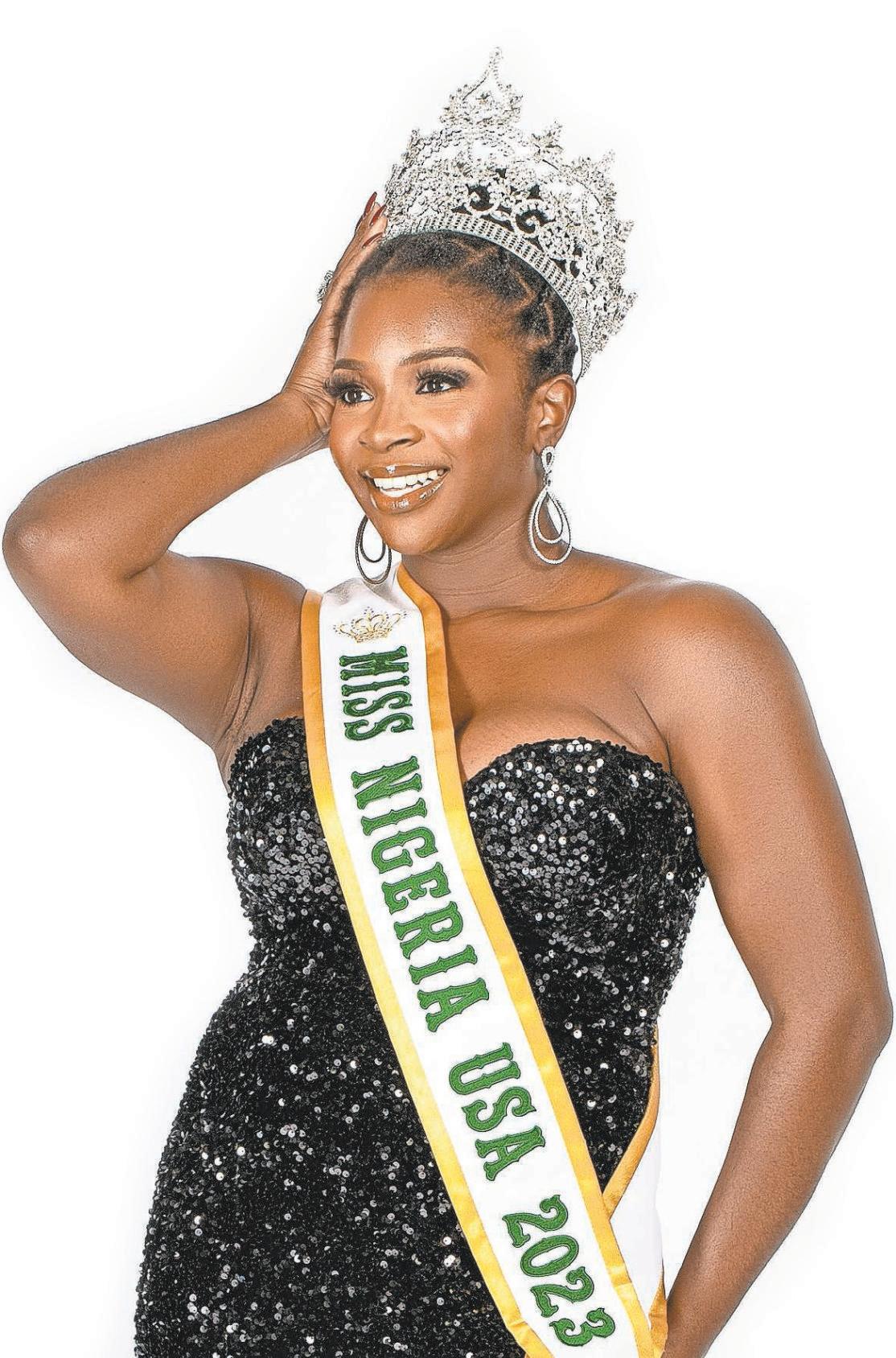
DEFENDER: What initiatives orprojectsareyoufocusingonduring your reign as Miss Nigeria USA?
IKAIDDI: In the United States, I’m going to be focusing on kind of shining a light on other nonprofits that focus on women’s empowerment, youth empowerment, and then mental health awareness. I’ve already worked with a couple of nonprofits in the Austin area to attend their events and help with Read Across America, which is happening in March. Also, different events during Black History Month. So there’s a lot of ground to cover attending events and shining a light on my title and my pageant system.
In Nigeria, I’m actually gonna be there sometime this year. Everything hasn’t been solidified yet, so I can’t say exactly when. But I’ll be there to host a couple of events for young women all over Nigeria. Actually, I’m going to be hitting about two, or three different cities while I’m there. Hosting youth events, trying to empower as many women as possible, connecting with other pageant queens, and really shining a light on the importance of sisterhood and female unity. Um, and spreading the message behind mental health awareness. It’s really important for us to be aware of our own mental health and how that helps us physically.


For the second straight season, the University of Houston Cougars men’s basketball team has earned a No.1 seed in the NCAA Tournament.
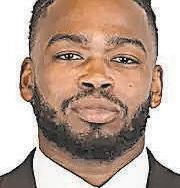
 Jamal Shead
Jamal Shead
It’s the third time in school history that UH has been picked as a No.1 seed in the NCAA Tournament. The Coogs, led by Jamal Shead and L.J. Cryer, are the top seed in the South Region and will take on No.16 seed Longwood in Memphis on Friday. Should UH (30-4) make it through the first two rounds of the Tournament, they will head to Dallas for next week’s regional. Last season, the Cougars advanced to the Sweet 16 before losing to Miami. The Cougars made it to the national championship game in 1983 when they were a No.1 seed.
The Rice women’s basketball team is back in the NCAA Tournament for the first time since 2019.

The Owls punched their ticket after winning the American Athletic Conference Tournament championship as a No.10 seed, becoming the lowest seed to win the conference tournament in history. Rice (19-14), seeded 14th, will face No.3 seed LSU, the defending national champions, during the March 22 opening round in Baton Rouge, La. (3 p.m., ESPN).
 Malia Fisher
Malia Fisher
In a move that is sure to be scrutinized, Texans general manager Nick Caserio traded out of the first round of this year’s NFL Draft.

 Nick Caserio
Nick Caserio
The Texans sent their No.23 pick overall and a seventh-round selection to Minnesota in exchange for the Vikings’ second-round pick (No.42), sixth-round pick (No.188) and second-round pick in 2025.

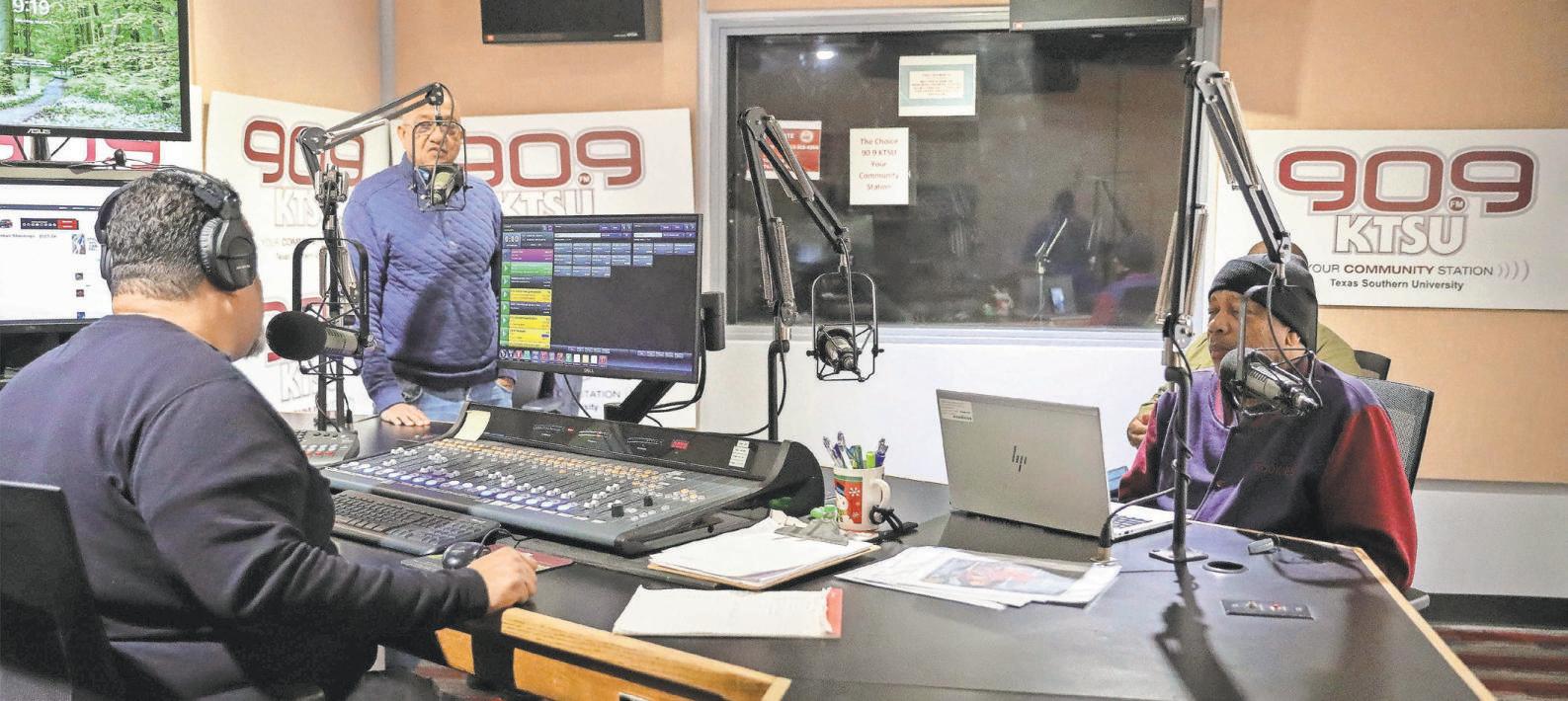
It’s 8:45 a.m. on a recent Saturday morning, and things are starting to pick up in one of the studios of the KTSU 90.9 FM building that sits on the edge of the Texas Southern University campus.
Devan Wade is running through all of the checks, and slowly but surely, Kevin Allen aka The Silver Fox and Radio Hall of Famer Ralph Cooper trickle in just ahead of their 9 a.m. airtime.
Just like that, the KTSU Sports Talk Show has hit the airwaves. Buckle up for the fastest sports hour in radio and be ready for an unhinged sports conversation that segways effortlessly from the Texas Southern – Prairie View basketball rivalry to the latest on the Texans, Astros, Rockets and really any topic dealing with sports.
“It’s sort of a barbershop conversation for the city of Houston,” said Wade, who is the founder of the show. “We talk about everything from Texas Southern to the pros and national sports stories. It’s a catch-all where we talk about anything and everything.”
This is exactly what Wade envisioned when the long-time sports journalist first pitched the idea of doing a sports talk radio show to KTSU. Wade recognized there was a void in the Houston market regarding Black voices discussing local and national sports and he offered a solution to filling it.
Over the more than 20 years on air, the voices and opinions have changed on
Houston’s longest continuously running Black sports radio talk show but the mission of being a place where the listening audience can tune in to conversations they connect with has remained the same.
“When you have a sports talk show that has been around this many years consistently on the air and hosted by three African American men, to me that is something that is missing in our community,” said KTSU general manager Ernest Walker. “When we talk about sports there are a lot of African Americans who dominate in sports and we need to be telling and talking about it from our point of view no matter whether is national sports, pro sports or college sports.”
The latest version of the show, which includes Wade, Cooper and The Silver Fox, has been on air together for a little over four years. The trio exudes chemistry as they go unscripted for an hour and often features Cooper and Allen intensely debating sports topics while Wade, who is the host, plays referee.
On this recent Saturday morning, the subject was the upcoming TSU – Prairie View regular-season finale basketball game. Cooper, who is a virtual sports historian having broken many racial barriers in sports media during his 50-plus years in the market, went way back to all of the TSU players he remembers watching as a kid when the Tigers played at the Fairchild Building (now the TSU Museum).
Cooper, who stands up the entire show, starts rattling off all of the great TSU players
he had watched since he was a kid in the 1950s and 1960s.
The Silver Fox interrupts mid-sentence, “They said you saw Moses play.”
“I can’t remember that one,” Cooper shoots back.
And it continues from there. In all honesty, Cooper seems to be having a great time mixing it up with the guys he calls inspirations.
Cooper, who is a true pioneer as a sports journalist, still does his own show during the week over at KCOH, but jumped at the invitation to come join The Silver Fox and Wade.
“Getting a chance to work with him was a lift and an inspiration,” said Cooper, who pointed to Allen. “When you’ve been around and worked with other people, you enjoy working with people who look like you. That’s one of the joys of doing this program with them.”
The love and admiration are definitely returned.
“Growing up, watching Ralph and some of the things that he has done in the past and all of the information and knowledge that he has and my passion for sports, I look up to him,” The Silver Fox said. “It’s fun for us. But we have some knockdown, drag-outs sometimes, too. But we respect each other and respect each other’s inputs and thoughts.
“I appreciate Devan bringing me on some years ago, giving me an opportunity in this profession, and being alongside of Ralph is awesome,” said Allen.



 By Jimmie Aggison
By Jimmie Aggison
In baseball, the number of young Black male athletes has dwindled over the years. According to the Major League Baseball (MLB), diversity is up, but there are still focused efforts to improve Black participation in the sport as less than 7% of MLB players identify as Black. Madison High School second baseman Tyren Reaves is part of that dwindling number of Black youth who still have a love baseball and are committed to playing the game.
“We don’t have enough brothers out here; it’s just not enough of us. In the major leagues, there are far more players of other ethnicities playing but I feel if we get more involved and play the sport earlier in our career, we can make a good play just like Bo Jackson and the rest of them,” said Reaves.
Reaves, a senior, began playing baseball when he was eight years old after idolizing his cousin, Paul Davis, who also shared a love for the sport.
“We were cousins, but we were more like brothers. We grew up at my grandmother’s
house together. We were always together, one unit. We always had each other’s back. It was me and him, ride or die,” said Reaves.
Davis pitched for Sterling High School before tearing his rotator cuff and ending his dreams of playing at the next level.
“He was unable to recover from that injury,” said Reaves. “Once his dreams of playing in the MLB were a distant memory, he enlisted in the army because he couldn’t throw anymore. I continued because I wanted to carry on the legacy.”
Reaves has since become a four-year varsity starting second baseman for the Marlins.
“My baseball IQ has gotten better, and so has my confidence. If I would have known my freshman year what I know now, I would have been even more advanced,” said Reaves.
Reaves enjoys watching Houston Astros second baseman, Jose Altuve, who stands 5-feet-6 but has a huge impact while on the field.
“I like the way he plays. A lot of undersize guys are looked over, but his impact on the game is unmatched,” said Reaves.



In 2020 due to a health-related issue, Reaves lost one of his biggest supporters, his grandmother.
“She used to say she’ll always be around even though if she’s not here, always look up and she’ll be there,” said Reaves. “My grandma and I were tight. It was very traumatic when she passed away. It changed my outlook on life, and made me appreciate life more.”
Suddenly, the game that brought joy and an escape from life problems, soon found Reaves caught in his head as he struggled with the passing of his grandmother.
“I went into a slump, a little depression. My teammates talking to me and motivating me helped pull me back. Eventually, I learned to play for her instead of playing sad,” said Reaves.
Next season Reaves will be attending Texas Southern University on an academic scholarship. He plans to walk on the baseball team and major in biology with plans of going into the dental hygienic field after graduation.
“My mom is a clinical director of several dental offices,” said Reaves. “She brought me around a lot of doctors while I was young. On the weekends I do ortho and braces. I have experience in doing adjustments and taking X-rays. Growing up around it made me love it. I see it as easy money in the air conditioning.”
Class: 2024
IG: @huncho_ty
Position: Second base
Height & weight: 5-feet-10, 175 pounds
Players he studies: Jose Altuve (Houston Astros)
Status: Uncommitted
Favorite artist: J. Cole
Favorite subject: Biology
Shout-outs: Mom
Maybe the only thing Charles E. Johnson Jr. (aka J.J.) loves more than music is his home state New Orleans Saints and fshing.
But then again, neither the Saints nor any amount of time on the water trying to catch bass, trout, or perch could keep Johnson from playing music. And he does so darn near every day of the week, gracing multiple congregations with his skills as the ofcial musician-in-residence, while also traveling the region and country performing with his group, J.J. and the Perfect Strangers Band.
The Defender spoke with Johnson about his rising fame in Houston’s church and club scenes as a musician unparalleled in his ability to play anything, anywhere, anytime.
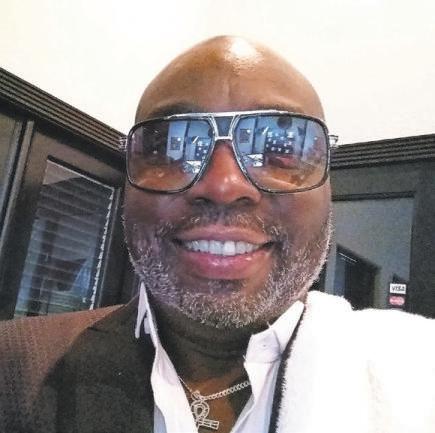
DEFENDER: Whenwereyoufrst introduced to music?
JOHNSON: Oh, I was about seven years old. And, a guy moved to Louisiana from Massachusetts, and he came to our church and he was ofering music lessons for the kids in the church. So, my mom signed me and my sister up, and she bought us a piano and put the piano in the house, and it just kinda went from there, man. I started banging on the piano and found out that I had a gif. And that was about 44, 45 years ago. I’ve been playing ever since.
DEFENDER: Whendidyouknowthat musicwasthisthingthatwasgoing tobringyoubothjoyandapaycheck?
JOHNSON: <laughs> Probably about the age of 12. Because I started when I was like 10, but I was 12 or 13 when churches started really paying me. Tey started at $40, $50. Ten, as I got older, it just went up. It went up from $50, $100, $150, $200. It just kept going up, up, up because my ability was increasing. I
When you go and you rehearse and you take the time to work out the songs, and then you’re able to deliver a good performance…that’s what I love to do”CHARLES “J.J.” JOHNSON JR.


was developing my gif and my ability and it got better and better. And, they didn’t look at me as this little kid who could play. Tey were going by what they were hearing when I played. My gif, my ability grew, and so did the pay.
DEFENDER: Youdon’tjustdoyour thinginthechurch.Youhaveyour owngroupandy’allplaygigs,concerts,andevents.Whendidthat startforyou?
JOHNSON: I was about about 20 or 21; when I frst came here to Houston. A guy by the name of Sly Green, they put me into a band called Te Slam Band. Actually, I moved back to Houston. I was in Massachusetts afer a while and moved here, and I started playing, I was gigging probably like four or fve nights a week down here. Tat kinda got me in the groove of gigging, and taught me the business and how it really goes and everything.
DEFENDER: Whatisitthatyoulove most about music?
JOHNSON: It’s the preparation, and when the preparation manifests itself at the performance. When you go and you rehearse and you take the time to work out the songs and everything, and then you’re able to deliver a good performance on that Sunday or that Saturday, Friday, whenever it is. Tat’s what I love to do. I love to rehearse, and I like being around musicians who love to rehearse and perfect what we’re going to do. If we’re going to do three songs, let’s do the very best we can do on these three songs. A lot of musicians, especially in the Houston area, they just gig. Tey just show up, no practice, and wanna play. Nah, man. Not for me. I don’t do that.
DEFENDER: Anyadviceforup-andcomingmusicians?
JOHNSON: One good piece of advice I could give a young musician that’ll take them a long way: try to learn how to play in all of your keys. Some keys are easier than other keys. Any real musician will tell you, some keys are very uncomfortable to play in, but you have to do it. Tat’s the only way to get better. You can’t run from those keys and you can’t “transport.” I play a lot of keyboards at one time. Tey have a transport button where you can play in one position and transform diferent keys. Tat doesn’t work when you’re playing the organ or when you’re playing multiple boards. So, I would say, learn to play in all of your keys. And less is more. A lot of guys, young guys, they play too much. Tey’re just all over the place. Less is more. And keep your ears open, too. Listen to the music. Keep your ears open.